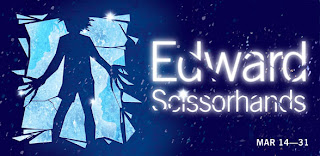 "Inherit The Wind" at the Lyceum Theatre, March 17, 2007
"Inherit The Wind" at the Lyceum Theatre, March 17, 2007Another revival of the Jerome Lawrence/Robert E. Lee play begins previews on Monday March 19, 2007 for a 16-week engagement. I was fortunate to be invited to one of the final dress rehearsals for what should have been a momentous evening of theatre. Two-time Tony winners each, Brian Dennehy and Christopher Plummer take up the roles of Matthew Harrison Brady and Henry Drummond, respectively. (Spoiler Alert)
I think that was director Doug Hughes' first mistake. We saw this kind of thing last year with "The Odd Couple" where the two leads were in the wrong roles. It's no wonder that Mr. Plummer preferred the role of Drummond. There's much more there to work with as an actor. Mr. Dennehy, some 10 years junior to Mr. Plummer, exudes a lasting strength and power in a role of a man who is losing exactly that long before he arrives on the scene.
As Drummond, Mr. Plummer reminds us why he has earned his reputation as one of the finest actors of our time. Even with the trembling hands and unsteadiness on his feet, his talent and skill distract us from the fact that Drummond is the younger man without detriment to the character. His presence is magnetic and his Drummond is nuanced and thoughtful.
As Brady, Mr. Dennehy gives us the beginnings of the shuffling steps of an old man, but never really reveals his inner weakness. There were a couple of exchanges with Mr. Plummer that appeared to be missed cues during the Act II courtroom scene, but I couldn't tell who had dropped the line. (According to an unsubstantiated and unverifiable grape vine, one of the two actors apparently showed up at the first rehearsal already off-book, causing a bit of tension early on in this production.) Ultimately it is Mr. Dennehy's own physical strength and bearing that undercuts his performance. His breakdown on the witness stand lacked the crumpling that foreshadows his final disintegration after the verdict is given.
Others in the cast included Denis O'Hare as E. K. Hornbeck, the journalist from Baltimore. Mr. O'Hare's Hornbeck is merely annoying in this production. He winks, he clicks, he snaps, he points, he nudges, but in the end he throws away his chance to give us a fully formed character. I don't think it helps much that Mr. Hughes has given him a man in a gorilla suit to play off instead of the organ grinder's monkey. His first entrance, embellished by his suit and straw hat by Santo Loquasto, made me wonder if he weren't supposed to be Harold Hill (which might be an interesting career choice for Mr. O'Hare).
Miscast as well is Byron Jennings as Reverend Brown. He cuts a fine figure in his white linen suit, but never seems to believe what he's saying. If this production does manage to extend, I'd love to see him take on the role of Henry Drummond. That could be some exciting theatre.
Bertram Cates, the accused is played by Ben Walker, looking a bit buff in his henley t-shirt for a schoolteacher in the 20s. His Bert is fresh-faced but not quite as callow as I'd think he could be.
As Rachel Brown, Maggie Lacey (thanks, Cameron) is blandly pretty and blandly portrayed. She manages some nice waterworks during her cross-examination scene, but that's a skill any good actor should have. Her expression is fairly blank across the rest of her performance. I never got a sense of chemistry between Rachel and Bert, so I didn't get where her concern for him came from. Was it the injustice she was witnessing? Was it love? (Turns out it was the latter, but we don't really know this until the end of the show.)
Santo Loquasto seems to have taken a note from Christine Jones on how to increase your audience size. 60-70 lucky audience members will get to sit on the stage during every performance. I can't imagine that to be enjoyable. You'll have your coats and bags checked and won't get a playbill until after the show is over. All this and your view of the actors' backs is occasionally blocked by scenery. Mr. Loquasto has done a nice job with the costumes, lots of linen and cotton to help suffer the heat of the summertime setting.
Mr. Hughes seems in search of a new concept for presenting this play, but hasn't yet found it. There was a bit of "operafication," a term I use to describe how some directors feel the need to fill unscripted moments with business, music or other odds and ends. (A recent and particularly bad example of this was NYC Opera's "Pirates of Penzance.") Pre-curtain, a gospel quartet enters and begins a series of hymns and songs, presumably to set the mood. The quartet returns from time to time, as well as inciting the entire cast to sing in a scene or two. While it did help set the mood and period, I didn't find it terribly successful in the end. It was pretty obvious to me that Mr. Hughes (nor anyone on stage, for that matter) had never been to a southern tent meeting. The prayer vigil scene lacked the kind of passion only a southern Baptist closed mind can produce.
Speaking of southern, where were the accents? Mr. Jennings sounded like a Presbyterian from Massachusetts.
As Drummond, Mr. Plummer reminds us why he has earned his reputation as one of the finest actors of our time. Even with the trembling hands and unsteadiness on his feet, his talent and skill distract us from the fact that Drummond is the younger man without detriment to the character. His presence is magnetic and his Drummond is nuanced and thoughtful.
As Brady, Mr. Dennehy gives us the beginnings of the shuffling steps of an old man, but never really reveals his inner weakness. There were a couple of exchanges with Mr. Plummer that appeared to be missed cues during the Act II courtroom scene, but I couldn't tell who had dropped the line. (According to an unsubstantiated and unverifiable grape vine, one of the two actors apparently showed up at the first rehearsal already off-book, causing a bit of tension early on in this production.) Ultimately it is Mr. Dennehy's own physical strength and bearing that undercuts his performance. His breakdown on the witness stand lacked the crumpling that foreshadows his final disintegration after the verdict is given.
Others in the cast included Denis O'Hare as E. K. Hornbeck, the journalist from Baltimore. Mr. O'Hare's Hornbeck is merely annoying in this production. He winks, he clicks, he snaps, he points, he nudges, but in the end he throws away his chance to give us a fully formed character. I don't think it helps much that Mr. Hughes has given him a man in a gorilla suit to play off instead of the organ grinder's monkey. His first entrance, embellished by his suit and straw hat by Santo Loquasto, made me wonder if he weren't supposed to be Harold Hill (which might be an interesting career choice for Mr. O'Hare).
Miscast as well is Byron Jennings as Reverend Brown. He cuts a fine figure in his white linen suit, but never seems to believe what he's saying. If this production does manage to extend, I'd love to see him take on the role of Henry Drummond. That could be some exciting theatre.
Bertram Cates, the accused is played by Ben Walker, looking a bit buff in his henley t-shirt for a schoolteacher in the 20s. His Bert is fresh-faced but not quite as callow as I'd think he could be.
As Rachel Brown, Maggie Lacey (thanks, Cameron) is blandly pretty and blandly portrayed. She manages some nice waterworks during her cross-examination scene, but that's a skill any good actor should have. Her expression is fairly blank across the rest of her performance. I never got a sense of chemistry between Rachel and Bert, so I didn't get where her concern for him came from. Was it the injustice she was witnessing? Was it love? (Turns out it was the latter, but we don't really know this until the end of the show.)
Santo Loquasto seems to have taken a note from Christine Jones on how to increase your audience size. 60-70 lucky audience members will get to sit on the stage during every performance. I can't imagine that to be enjoyable. You'll have your coats and bags checked and won't get a playbill until after the show is over. All this and your view of the actors' backs is occasionally blocked by scenery. Mr. Loquasto has done a nice job with the costumes, lots of linen and cotton to help suffer the heat of the summertime setting.
Mr. Hughes seems in search of a new concept for presenting this play, but hasn't yet found it. There was a bit of "operafication," a term I use to describe how some directors feel the need to fill unscripted moments with business, music or other odds and ends. (A recent and particularly bad example of this was NYC Opera's "Pirates of Penzance.") Pre-curtain, a gospel quartet enters and begins a series of hymns and songs, presumably to set the mood. The quartet returns from time to time, as well as inciting the entire cast to sing in a scene or two. While it did help set the mood and period, I didn't find it terribly successful in the end. It was pretty obvious to me that Mr. Hughes (nor anyone on stage, for that matter) had never been to a southern tent meeting. The prayer vigil scene lacked the kind of passion only a southern Baptist closed mind can produce.
Speaking of southern, where were the accents? Mr. Jennings sounded like a Presbyterian from Massachusetts.







